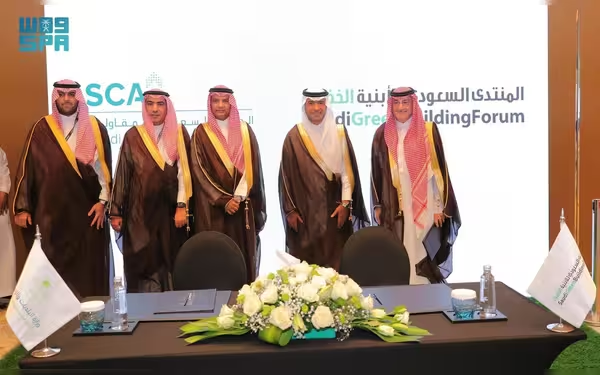Saturday, November 16, 2024 05:28 PM
Saudi Arabia Dominates Arab Green Building Initiatives with 2,000 Projects
- Saudi Arabia leads Arab region with 2,000 green building projects.
- Sustainability fund launched by Aramco to tackle climate challenges.
- Forum emphasizes collaboration for sustainable urban development.
 Image Credits: arabnewspk
Image Credits: arabnewspkSaudi Arabia leads the Arab region with 2,000 green building projects, showcasing its commitment to sustainability and urban development.
Saudi Arabia is making remarkable progress in the field of sustainable construction, leading the Arab region with a total of 2,000 registered green building projects out of 5,000 across the entire Arab world. This impressive achievement was highlighted by Minister of Municipalities and Housing Majed Al-Hogail during the opening of the 14th annual Saudi Green Building Forum, which took place in Riyadh from October 6 to 8. The forum serves as a significant platform for discussing the future of environmental sustainability in the region.
The increase in green building projects is a direct response to the rapid population growth in Saudi Arabia and a growing awareness of environmental issues. As more people inhabit the Kingdom, the demand for energy-efficient structures and the use of eco-friendly building materials has surged. According to market research from Prescient & Strategic Intelligence, the Saudi green building market is expected to generate a staggering $16.4 billion in revenue this year alone, with projections indicating a growth rate of 12.3 percent annually, potentially reaching $33.0 billion by 2030.
During his speech at the forum, Al-Hogail emphasized that these developments are a testament to Saudi Arabia's commitment to sustainable practices. He stated that the Kingdom is focused on transforming urban development qualitatively, which includes enhancing the efficiency of natural resource use, reducing carbon emissions, and creating healthier urban environments. This initiative is not just about building; it is about building responsibly and sustainably.
Al-Hogail also pointed out the significance of this year's forum, which addresses crucial issues related to environmental sustainability. He noted that green buildings play a vital role in achieving sustainable development goals, aligning perfectly with the objectives of Saudi Vision 2030. This vision aims to diversify the economy and reduce the Kingdom's dependence on oil, making sustainability a key focus.
In a related announcement, Waleed Al-Naim, Deputy Chief Engineer at Aramco, revealed that the oil giant has launched a $1.5 billion sustainability fund aimed at tackling climate challenges. This move reflects the growing recognition among major corporations of the need to invest in sustainable practices.
On the opening day of the forum, a memorandum of understanding was signed between the Saudi Green Building Forum and the Saudi Contractors Authority. This agreement aims to enhance collaboration in the construction sector by providing training programs, accreditation certificates, and opportunities for knowledge exchange through workshops and seminars. Such initiatives are crucial for promoting sustainable practices and raising environmental awareness within the industry.
This year's forum also focused on optimizing city operations in line with green building standards while addressing the interconnectedness of construction, infrastructure, and environmental issues such as climate change and desertification. The emphasis is on strengthening government roles and fostering partnerships with the private sector to support the localization of sustainable development goals.
Since its inception in 2010, the Saudi Green Building Forum has positioned the Kingdom as a leader in sustainable development, earning recognition from the UN Economic and Social Council. As a vital platform for dialogue and collaboration, the forum continues to drive Saudi Arabia's sustainability agenda, shaping the future of green building and urban development in the region.
Saudi Arabia's commitment to green building projects not only showcases its leadership in sustainable development but also sets a precedent for other nations in the region. As the Kingdom continues to invest in eco-friendly practices, it paves the way for a healthier environment and a more sustainable future for generations to come. The ongoing efforts in this sector highlight the importance of collaboration between government and private entities, ensuring that the goals of sustainability are met effectively and efficiently.













